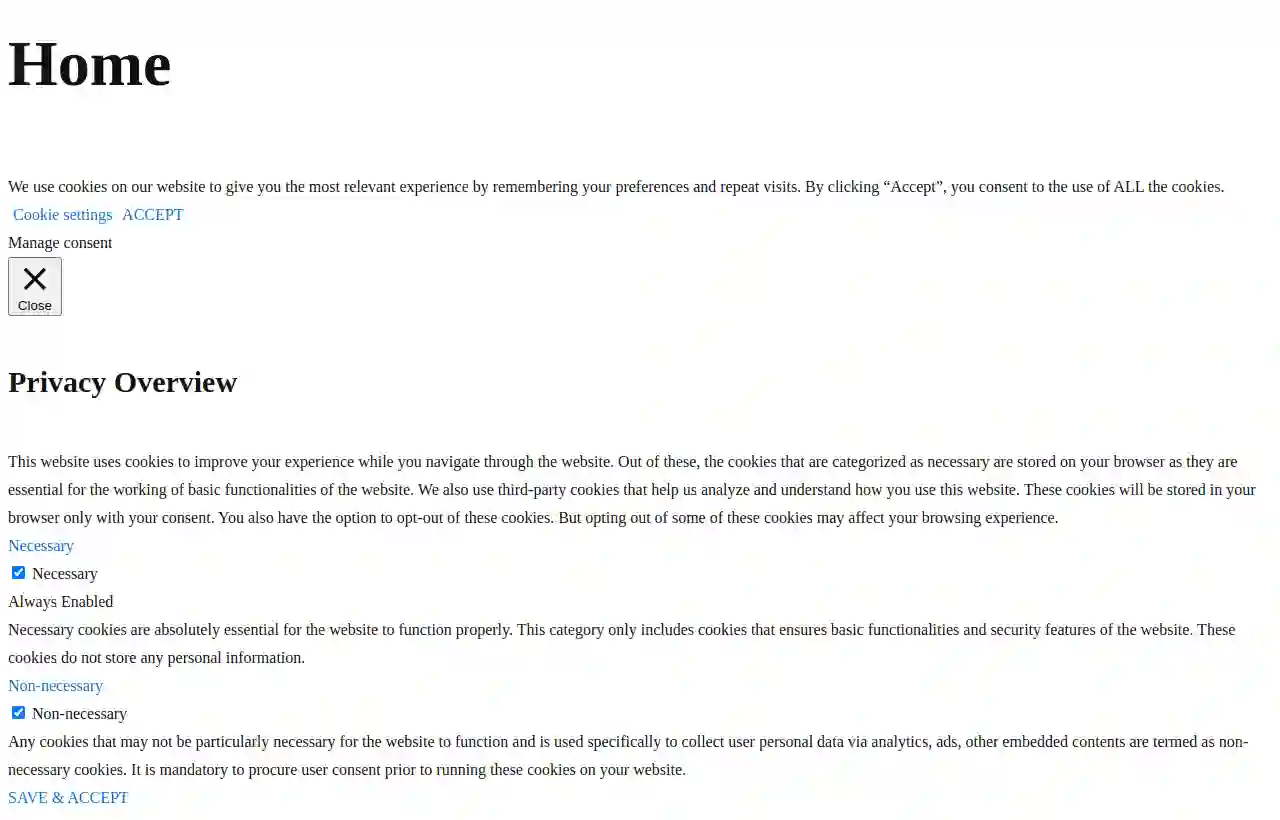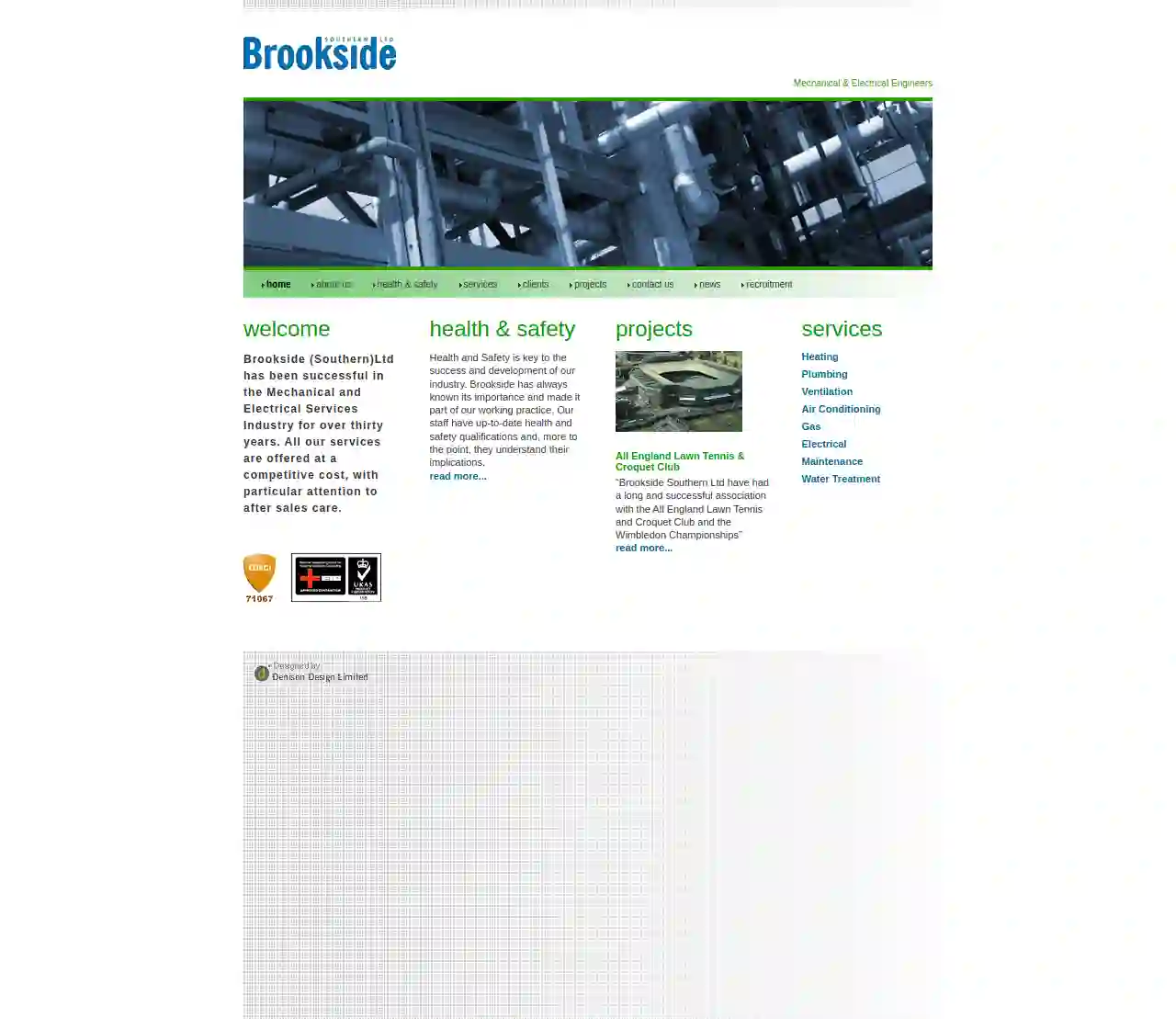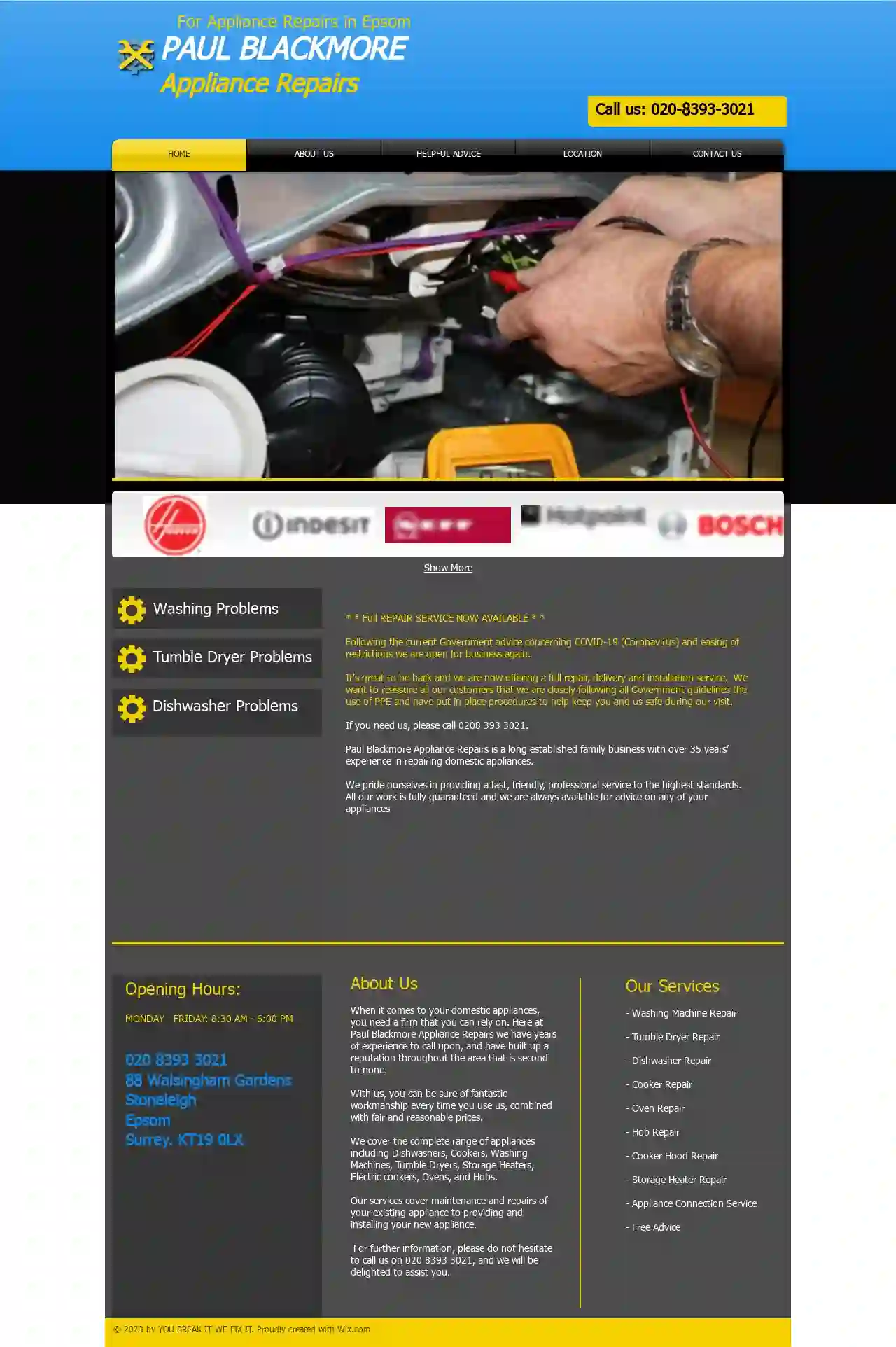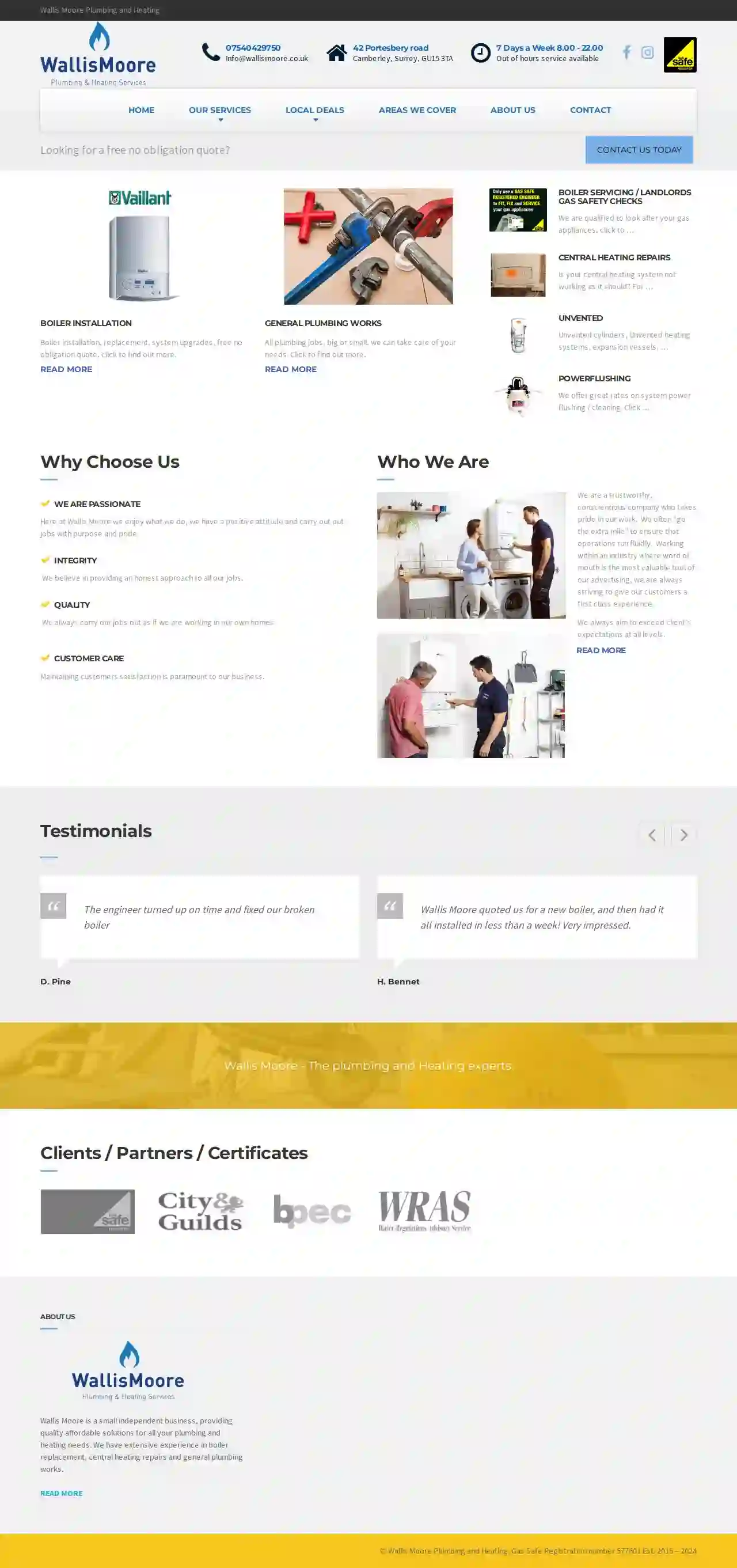HVAC Companies Dorking
Top 10 Heating and Cooling Services in Dorking
Get 3 FREE HVAC Contractor quotes for your project today! Compare profiles, reviews, accreditations, portfolio, etc... and choose the best offer.

Fuller Heating
4.319 reviews451 Kingston Road, Epsom, KT19 0DB, GBLooking for trustworthy and reliable heating engineers? Look no further. If you require cost effective, reliable heating and plumbing engineers then look no further. We cater to all domestic and business customer’s central heating systems, gas services and plumbing requirements. Fuller Heating are a long established heating company offering many boiler and plumbing services in Surrey and South West London. Our showroom in Epsom contains a wide range of Worcester Bosch boilers. We are thermotechnology specialists. Established since 1991, we have the knowledge and expertise needed to ensure that you receive nothing but the best service. Our reputation has been developed through hard work and reliability which is why we are the area’s number one choice for plumbing and gas related work. Get in touch today Don’t just take our word for it! Check out our trusted reviews online. Trustpilot Spread the cost of your new boiler with monthly payments. Upfront £625 Including VAT Monthly £22.39 7.9% APR From 2 - 10 years finance options 0% interest free options available 12 year guarantee* Find out more We offer you the highest quality workmanship and services Our Services Include New Boilers Boiler Service & Repairs Heating Controls Renewable Energy Boiler installation & servicing Central heating installations Energy efficiency advice Gas safety inspections Heated towel rail fitting Hob & gas oven fitting Hot water cylinders Kitchen sinks Landlord safety reports Leaks & overflows Power-flushing Pump replacements Renewable energy products Shower & bathroom fitting Heat pumps
- Services
- Why Us?
- Accreditations
- Gallery
Get Quote
Absolute Climate Ltd
Guildford, GBAbsolute Climate are leading experts on Air Conditioning, Applied, Ventilation & Control Systems. We provide a comprehensive range of services to meet all your needs, from design and installation to commissioning, maintenance and repair. Our team of highly skilled engineers has extensive experience in the industry and is dedicated to providing our clients with the highest quality service. We are committed to delivering innovative technical solutions that are tailored to the specific requirements of each project. Contact us today to discuss your needs.
- Services
- Why Us?
- Gallery
Get Quote
Smith Mick Heating & Plumbing Ltd
56 reviews6 Weydown Close, Guildford, GU2 9YL, GBHEATING & PLUMBING IN GUILDFORD GAS SAFE NO. 135488 Whether you require a Gas Engineer or a General Plumber in Guildford look no further than Mick Smith Heating and Plumbing Ltd. Based in Guildford for over 40 years, the Company first started in 1980, Mick started out on his own and over the years has built up a strong constant growing customer base, which is generated from first time customers, who have recommended the use of our services, to their colleague''s, friends and relatives. In addition to this we have and continue to work for a number of Contractors and Businesses. We provide a polite and friendly service that is both prompt and reliable. We guarantee a high standard of work. Mick Smith Heating & Plumbing Ltd offers an expert and trustworthy service in a wide range of Heating and Plumbing in and around the Guildford area. We are proud to offer a first class service to all our clients so call and put us to the test. We provide... • Central Heating Installations • Underfloor Heating Installations • Boiler Repairs and Servicing • Boiler Replacements • Power Flushing Heating Systems • Gas Appliance Installations • Landlord Gas Safety Certificates • Bathroom and Shower Installations • General Plumbing Call Us... For further information about Heating, Boiler, Plumbing or Bathroom installations in Guildford please don't hesitate to call:- Mick Smith Heating and Plumbing Ltd . Tel: Office Kerry 07979151200 - Mick 07790025153 - Alex 07932018965 We offer a comprehensive service at competitive rates so call today
- Services
- Why Us?
- Accreditations
- Our Team
- Gallery
Get Quote
Mulgas Ltd
4.565 reviewsUnit 9d, Manor Way, Old Woking, Woking, GU22 9JX, GBMulgas is a leading provider of central heating services, specializing in repairs, servicing, and installation. With a focus on leading-edge technology, we pride ourselves on delivering exceptional customer service and clean, tidy workmanship. Our team is Gas Safe registered and has received numerous accreditations, including Which? Trusted Trader and Checkatrade. We cover most of Surrey and surrounding areas, including Woking, Guildford, and London. Contact us today to book a visit or get a quote.
- Services
- Why Us?
- Accreditations
- Our Team
- Testimonials
- Gallery
Get Quote
BTU (Installation & Maintenance) Ltd
2.724 reviews38 Weyside Road, Guildford, GU1 1JB, GBEstablished for over 55 years, BTU is one of the larger companies in the South East installing and maintaining heating and cooling systems for large public, industrial and commercial buildings. By building a loyal team of dedicated professionals in the areas of systems design, installation, operation and maintenance, we continue to expand our capabilities and now cover all the services listed below. Our customer commitment is to deliver the best possible value to our customers through employing industry leading staff, engineers and technology to ensure “right first time” maintenance and installation. BTU Group is a family owned and operated company working across London and the South East.
- Services
- Why Us?
- Gallery
Get Quote
The Boiler Engineer
12 reviewsAshford, GBThe Boiler Engineer Ltd. is a family-based company with over 30+ years of experience in the domestic and commercial plumbing and heating industry. We provide a range of services, including boiler installations, repairs, and maintenance, as well as air conditioning installations and repairs. We are proud to be a trusted and reliable company, with a reputation for providing excellent customer service and high-quality workmanship. Our team of experienced engineers are fully qualified and trained to work on all types of boilers, including gas, oil, and LPG. We also offer a range of finance options to help make our services more affordable. With our expertise and commitment to customer satisfaction, we are the perfect choice for all your heating and plumbing needs.
- Services
- Why Us?
- Accreditations
- Our Team
- Testimonials
- Gallery
Get Quote
Brookside (Southern) Ltd
32 reviewsWonersh, Guildford, 2 The Common, GU5 0PJ, GBBrookside (Southern) Ltd has been successful in the Mechanical and Electrical Services Industry for over thirty years. All our services are offered at a competitive cost, with particular attention to after sales care. Health and Safety is key to the success and development of our industry. Brookside has always known its importance and made it part of our working practice. Our staff have up-to-date health and safety qualifications and, more to the point, they understand their implications. Our engineers are experienced in their respective disciplines and take pride in what they do. See vacancies for career opportunities with us. All engineers and new recruits must share our commitment to excellent standards. Continual professional training has made for a rich mix of expertise and individual initiative so that we can offer you a first class service. Brookside (Southern) Ltd is fully registered with CORGI and NICEIC. Est. since 1971 Brookside was launched in 1971 to provide heating and plumbing services. Over the years, it has developed into a very successful business. We have expanded our range to include design consultancy, ventilation, air conditioning, and electrical services. We also provide a comprehensive building maintenance operation. We work both as a primary contractor and as a nominated subcontractor. Protecting you Our maintenance business protects you. It is far more cost effective to foresee problems than to solve issues after they have caused damage and loss to your business. The potential for breakdown is considerably lowered by anticipating critical periods such as the extreme temperatures in the middle of summer or in winter and keeping all equipment maintained and serviced. Flexibility Brookside benefits from the careful attention to clients associated with a family business, yet the team is open to new ideas and experience, possessing the imaginative energy of a new enterprise. We are committed to providing our clients with a solution that best fits their needs. Our project managers have hands-on responsibility for the day to day management of our sites and all projects are monitored to ensure they reach our consistently high standard and meet the tightest deadlines.
- Services
- Why Us?
- Accreditations
- Gallery
Get Quote
Paul Blackmore Appliance Repairs
521 reviews88 Walsingham Gardens, Epsom, KT19 0LX, GBPaul Blackmore Appliance Repairs is a family-run business with over 35 years of experience in repairing domestic appliances. We pride ourselves on providing a fast, friendly, and professional service to the highest standards. All our work is fully guaranteed, and we're always available for advice on any of your appliances. We cover a complete range of appliances, including dishwashers, cookers, washing machines, tumble dryers, storage heaters, electric cookers, ovens, and hobs. Our services range from maintenance and repairs of your existing appliances to providing and installing new ones. For more information, please call us on 020 8393 3021.
- Services
- Why Us?
- Gallery
Get Quote
Capitol Engineering Services Ltd
32 reviewsEpsom, GBThe Capitol Group is a leading building services company in the UK, established in 1993. With regional offices across the South, South West, Midlands, and Northern regions, they provide a nationwide service. The company specializes in integrated FM, mechanical, electrical, and building services, offering a comprehensive range of solutions from design and build to maintenance and refurbishment. They are committed to delivering high-quality services and exceeding customer expectations. The Capitol Group's success is built on its experienced team, investment in people, and dedication to providing exceptional customer service.
- Services
- Why Us?
- Accreditations
- Our Team
- Testimonials
- Gallery
Get Quote
Wallis Moore Plumbing & Heating
59 reviews42 Portesbery road, Camberley, GU15 3TA, GBWallis Moore is a small independent business, providing quality affordable solutions for all your plumbing and heating needs. We have extensive experience in boiler replacement, central heating repairs and general plumbing works. We are a trustworthy, conscientious company who takes pride in our work. We often “go the extra mile” to ensure that operations run fluidly. Working within an industry where word of mouth is the most valuable tool of our advertising, we are always striving to give our customers a first class experience. We always aim to exceed client’s expectations at all levels.
- Services
- Why Us?
- Accreditations
- Testimonials
- Gallery
Get Quote
Over 12,692+ HVAC Contractors on our directory
Our HVAC contractors operate in Dorking and surroundings!
HVACCompaniesHub has curated and vetted the Best HVAC Businesses near Dorking. Find a trustworthy pro today.
Frequently Asked Questions About HVAC Companies
- AC not cooling: Refrigerant leaks, compressor issues, or thermostat problems.
- Furnace not heating: Pilot light or ignition control issues, blower motor problems, or clogged filters.
- Uneven temperatures: Ductwork leaks, inadequate insulation, or faulty thermostats.
- Poor air quality: Dirty air filters, mold growth in ductwork, or inadequate ventilation.
- Strange noises: Unusual sounds from the system can indicate a variety of problems with different components.
- High energy bills: Inefficient systems, ductwork leaks, or improper thermostat settings.
- Frequent Repairs: If your system requires repairs frequently, it may be more cost-effective to replace it.
- Age of System: HVAC systems typically last 15-20 years. If your system is nearing or beyond that age, it's likely less efficient and more prone to breakdowns.
- Increased Energy Bills: A significant rise in energy bills might mean your system is losing efficiency and needs replacement.
- Uneven Temperatures: If some rooms are too hot or too cold, it could be a sign of an inefficient HVAC system.
- Poor Indoor Air Quality: If you're experiencing allergies, dust, or other indoor air quality issues, a new HVAC system with better filtration could help.
- Strange Noises or Smells: Unusual noises or foul odors emanating from your HVAC system could signal the need for a new HVAC system.
- Change Air Filters: Change or clean your air filters every 1-3 months. Dirty air filters restrict airflow and decrease system efficiency.
- Clear Debris: Keep the area around your outdoor unit clear of debris, leaves, and snow.
- Check Thermostat Settings: Make sure your thermostat is set to the desired temperature and is functioning correctly.
What are the most common HVAC problems?
Common HVAC problems include:
What are the signs that I need a new HVAC system?
What regular maintenance should I do on my HVAC system?
What is the difference between an AC unit and a heat pump?
What are the most common HVAC problems?
Common HVAC problems include:
- AC not cooling: Refrigerant leaks, compressor issues, or thermostat problems.
- Furnace not heating: Pilot light or ignition control issues, blower motor problems, or clogged filters.
- Uneven temperatures: Ductwork leaks, inadequate insulation, or faulty thermostats.
- Poor air quality: Dirty air filters, mold growth in ductwork, or inadequate ventilation.
- Strange noises: Unusual sounds from the system can indicate a variety of problems with different components.
- High energy bills: Inefficient systems, ductwork leaks, or improper thermostat settings.
What are the signs that I need a new HVAC system?
- Frequent Repairs: If your system requires repairs often, it may be more cost-effective to replace it.
- Age of System: HVAC systems typically last 15-20 years. If your system is nearing or beyond that age, it's likely less efficient and more prone to breakdowns.
- Increased Energy Bills: A significant rise in energy bills could indicate your system is losing efficiency and needs replacement.
- Uneven Temperatures: If some rooms are too hot or too cold, it could be a sign of an inefficient HVAC system.
- Poor Indoor Air Quality: If you're experiencing allergies, dust, or other indoor air quality issues, a new HVAC system with better filtration could help.
- Strange Noises or Smells: Unusual noises or foul odors emanating from your HVAC system could signal a problem that requires a system replacement.
What regular maintenance should I do on my HVAC system?
- Change Air Filters: Change or clean your air filters every 1-3 months. Dirty air filters restrict airflow and decrease system efficiency.
- Clear Debris: Ensure there are no obstructions near the vents inside your home.
- Check Thermostat Settings: Make sure your thermostat is set to the desired temperature and is functioning correctly.